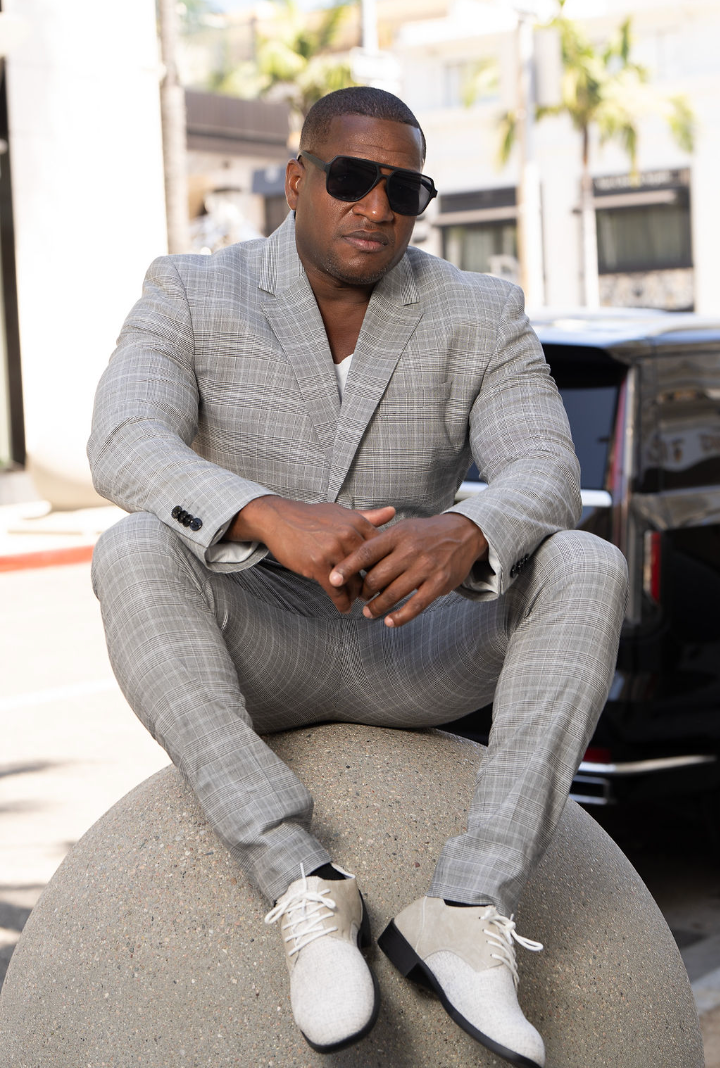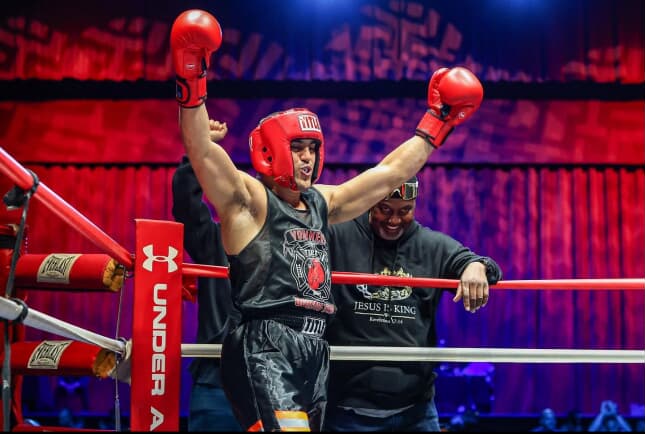We Speak Sports
James Lamont Dunn: Architect of Dreams

James Lamont Dunn: A Beacon of Inspiration
Born on September 14, 1978, James Lamont Dunn has evolved from an accomplished athlete to a multifaceted global influencer, exemplifying authenticity and resilience. His diverse portfolio spans sports, fashion, pageantry, and community service, leaving an indelible mark on the world stage.
Early Life and Athletic Pursuits
Dunn’s passion for martial arts and sports began at a young age. Despite facing challenges, he excelled academically and athletically at Patrick Henry High School. His commitment to sports paved the way for a career inspiring young athletes and promoting physical fitness.
Military Service and Boxing Career
Dunn’s journey took an unexpected turn when he joined the military, honing leadership skills and gaining invaluable life experiences. Upon completing his service, he dedicated himself to boxing as a coach and mentor. His contributions to the sport extend beyond management; he empowers young boxers through voluntary work.
Professional Ventures and Achievements
In 2020, Dunn became Vice President of Talent Support for the BMMAFU Boxers Union and a prominent boxing promoter. As Secretary of the World Boxing Committee, he played a crucial role during the COVID-19 pandemic, supporting athletes and cultivating values within the sporting community.

Fashion and Pageantry
Dunn’s influence extends to fashion and pageantry, earning titles such as Classic Mr. WOW World 2021 and Mr. Global America Nation 2023-2024. His unique style and ability to navigate high fashion and relatable looks make him a favorite among designers and enthusiasts.
Voice Acting and Global Ambassadorship
Dunn has ventured into voice acting, bringing characters to life. As a Global Ambassador, he advocates for social causes, promoting unity, diversity, and empowerment. He mentors young people entering the fashion and sports industries, instilling values of hard work, integrity, and resilience.
A Vision for the Future
James Lamont Dunn’s journey is a testament to perseverance and authenticity. His vision extends beyond personal achievements; he aspires to leave a legacy of empowerment and inspiration. Dunn reminds us to never give up on our dreams, always putting God first and pushing toward the mountain top.
Legacy and Impact
In a world yearning for true leaders, James Lamont Dunn stands out as a figure who embodies excellence, compassion, and the relentless pursuit of dreams. His story is not just about accolades but about making a lasting impact and inspiring the next generation to lead with purpose and passion.
We Speak Boxing
Beneath the Gloves and Behind the Badge: The Untold Fight of Christopher ‘Wildstyle’ Paladino, Where Every Round Is a Statement and Every Scar a Stand for Something Greater

Christopher “Wildstyle” Paladino is a relentless force in the ring and a firefighter in the streets, burning through limits and lighting up arenas with heart and havoc. Fighting out of Yonkers Knockouts and competing at 165 pounds, the type 1 diabetic doesn’t just box—he battles for something bigger. From starting Taekwondo at age 7 to launching community fight nights that raise money for causes like the Tunnel to Towers Foundation, Paladino has turned combat sports into a mission. Focused, fearless, and forged through adversity, Wildstyle is proving that no diagnosis, no setback, and no opponent can extinguish a fighter with purpose.
What inspired you to start training in combat sports?
Combat sports gave me structure at a young age. I started Taekwondo at 7 and competed at a national level. That discipline lit a fire in me—a love for competition and self-mastery. Over the years, I kept chasing challenges: wrestling in high school, Judo in college under Olympian Dr. Rhadi Ferguson, and eventually boxing, which truly clicked. Boxing became more than just a sport—it became a platform. Now, as a firefighter and type 1 diabetic, I step into the ring to inspire, raise awareness, and fight for causes bigger than myself.
Which discipline did you start with, and how has your style evolved?
Taekwondo taught me balance and precision. Wrestling gave me grit and relentless pressure. Judo brought control and leverage. But boxing unified everything—it became my expression of all that training and life experience. My style now blends calculated aggression with calm adaptability. I don’t just fight—I read, adjust, and strike. My mindset’s shaped by every battle inside the gym and every fire I’ve walked through outside of it.

How would you describe your fighting style in one sentence?
They call me Wildstyle—once I start, there’s no stopping the storm; firefighter by day, fighter by nature, burning through limits for causes bigger than myself.
Who are your biggest influences or role models in combat sports?
I draw from fighters who carry purpose with their power. Micky Ward for his grit, Tyson for raw intensity, Lomachenko for surgical skill, and Ali for impact beyond the ring. I respect Stipe Miocic—another firefighter who became a UFC heavyweight champ while still serving his community. As a type 1 diabetic, athletes like Gary Hall Jr. and Scott Verplank showed me that chronic illness doesn’t define you—how you respond does.
What’s been the toughest fight of your career so far, and why?
Managing type 1 diabetes is a fight that never ends—but in the ring, it was County Clash: Westchester’s Bravest vs. Finest. I created that event to raise funds for the Tunnel to Towers Foundation. Days before the fight, my opponent pulled out. I took on a far more dangerous replacement—no hesitation. When you build something bigger than yourself, you don’t walk away. I didn’t win that night, but I proved I could lead, inspire, and keep swinging through it all.
How do you mentally prepare before stepping into the ring?
Like I’m heading into a fire—calm, focused, and present. Firefighting taught me how to control chaos. Diabetes taught me how to live with discipline. Before the bell, I visualize, regulate my breath, and remind myself why I’m here. This isn’t just about me—it’s about every kid who thinks their diagnosis or circumstance defines them. Once the bell rings, Wildstyle takes over—and there’s no looking back.

What’s your training schedule like during fight camp vs. the off-season?
In camp, it’s war mode. Two-a-days: mornings for conditioning and VO2 max work, evenings for technical boxing and sparring. Strength work fits around my firehouse shifts. Nutrition is surgical. Off-season, I stay sharp—light boxing, calisthenics, roadwork—and shift focus to business and recovery. I treat off-season like maintenance, but when the bell’s near, every move has purpose.
How important is diet and recovery in your routine?
As a type 1 diabetic, diet isn’t a detail—it’s a lifeline. I skip the legendary firehouse feasts when needed—because that Sunday sauce can throw off the whole week. Recovery is sacred too. Between training, firefighting, and business, I guard my sleep, mobility, and stress management like I do my gloves. Recovery and nutrition keep me dangerous.
Have you ever had to overcome a major injury or setback?
I broke my hand during a structure fire—again. It’s a recurring injury that sidelined me. But downtime doesn’t mean backslide. I used it to sharpen overlooked skills, study the game, and push my VO2 max. Setbacks don’t stop me—they redirect the work. When I come back, I come back smarter and stronger.
What’s your go-to move or combination?
Some things are better felt than explained. Come to one of our charity bouts—you’ll see it in real time. Just don’t blink.

Do you study your opponents or rely on instincts?
I study enough to catch habits—but once the bell rings, instincts take over. You can’t script chaos. That’s where I thrive. I don’t just react—I take control.
How do you handle nerves or pressure before a big match?
Pressure doesn’t rattle me—it sharpens me. The ring is where all the discipline pays off. Nerves remind you it matters—but once that bell rings, I’m dialed in. No fear. Just Wildstyle.
What’s one misconception about combat sports or fighters?
That we’re just brutes. In truth, combat sports are chess under pressure. The fighters I know are the most respectful, focused, and self-aware people you’ll meet. We just speak through punches.
Which do you value more: technique, power, or heart?
Heart, always. Power fades. Technique can fail. But heart? Heart keeps you going when everything else breaks down. You can’t teach it—and I bring it every time.

Do you have a dream opponent or match in mind?
I don’t chase names—I chase challenge. My dream match is under the lights, on a big stage, against someone I’m “supposed” to lose to. That’s where I shine. I’m building toward a national title—and I’m doing it to raise awareness for diabetes and elevate community through charity events.
How do you balance combat sports with personal life?
It takes structure and sacrifice. My schedule’s tight between firefighting, training, and running businesses—but I stay present wherever I am. When I’m with family or friends, I’m all in. When I’m in the gym, I’m locked in. I manage my time like I manage my fight strategy—deliberate and focused.
How do you stay focused during long, grueling rounds?
I stay in the moment. Pain is temporary—quitting isn’t. I breathe, listen to my corner, and execute. Years of chaos have trained me to stay calm when things go dark. That’s when I push harder. That’s Wildstyle.
How do you handle criticism?
I respect feedback from people who’ve earned that voice—my coaches John, Krystal, Marilyn, Norm, and Luis at Yonkers Knockouts. They bleed with me. Outside criticism? Depends who it’s from. Most critics don’t step in the ring. I follow the words of Teddy Roosevelt: it’s not the critic who counts. It’s the one in the arena.

How do you want to be remembered in the world of combat sports?
As a fighter who stood for something bigger. A firefighter who stepped into the ring with purpose. A type 1 diabetic who refused limits. A community leader who built platforms, not just a record. I want people to say: He brought pressure, he brought heart, he brought Wildstyle—and he inspired others to do the same.
What advice would you give young fighters just starting out?
Fall in love with the suffering—it’s where the growth is. Stay disciplined. Stay humble. Block out the noise and grind. It’s not an easy path—but if you stick with it, you’ll earn a life worth fighting for.
Whether you’re a coach, athlete, parent, or sports fan, I’d love to hear from you. Have a story idea? Want to collaborate on coverage? Looking to feature your team or athlete? Use the form below to get in touch.
-

 We Speak Volleyball5 days ago
We Speak Volleyball5 days agoBuilt for the Pressure, Wired to Compete: Loretta Duby’s Passionate Pursuit of Purpose Through Volleyball
-

 We Speak Track And Field1 week ago
We Speak Track And Field1 week agoShe Doesn’t Chase Medals, She Earns Them: Inside Aniyah Walker’s Drive And Dedication
-

 We Speak Track And Field1 week ago
We Speak Track And Field1 week agoPurpose in Every Throw, Anchored by Faith: Keira Frye’s Path to Greatness
-

 We Speak Boxing1 week ago
We Speak Boxing1 week agoGloria Bautista “The Pink Panther”: Calm Power In The Super Flyweight Division

